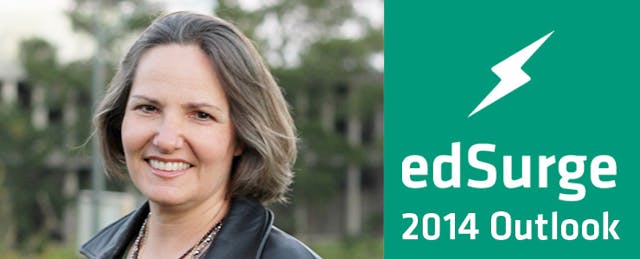Boulder Creek, nestled amid the great redwoods of California’s Big Basin state park, was once a logging town. In this rural outpost, pavement still gives way quickly to dirt roads. But on the edge of town, there’s a coffee shop with free Wifi, and when my errands brought me there at the end of 2013, a snaggletooth man with a bandana wanted to chat. He gestured at the battered notebook computer in front of him.
“Oh, these computers are great,” he enthused. “My son taught me all about it. I didn’t want to learn. But he made me. And I’ve thanked him several times. Why, I can get all kinds of books on this thing. And I looked up lots when I was dealing with my lung cancer.”
When old loggers remake themselves as learners, a new epoch is upon us. Call it the “learning era.” More and more of us--in the US and around the world--will make our living with our wits rather than our muscles. To do so, we will have to learn--actively and always.
And that means our framework for thinking about “learning” will stretch and bend in a thousand previously unimaginable ways.
Remember when “work” was something that happened between 9:00 am and 5:00 pm, in a building away from home?
Our attitudes toward learning--who learns, how they learn, when and where they learn and of course, what they learn--are similarly in flux.
We want our children to learn how to learn--and to realize that each one learns differently. We want them to capitalize on the things they do well and to get help on those things they find hard. We want our teachers to be our boldest learners, inspiring and leading students. We want learning to be genuine and meaningful, rather than a forced march through random questions designed to trick. We want learners to feel emboldened to ask challenging questions--and to have the resources to pursue answers or invent solutions. And we want learning to be part of everyone’s life, no matter what the background, ability or age of the learner.
We can’t do these things without appropriate technology. And so 2014 will be the year when we start to figure out just what--and when--technology is a useful lever to unlock learning for everyone, anywhere, and at any time.
Our journey has just begun. We’ve moved from the idea that every child in a class gets exactly the same assignment to different groups of students getting different assignments. That’s a bit like plunking the first motion picture camera in Row 10 of a theater and letting actors act in front of it.
Technology transformed the dramatic arts when the camera discovered its freedom to roam anywhere--and began providing the close-ups, panoramas and startling perspectives that transcended the static limitations of staged performance. Later, when digital technology began creating any effect we could imagine, movies became even richer and more intriguing, a different experience than the stage offered.
We’re not quite there yet: We haven’t figured out how to wield data in ways that support individualized learning without putting privacy at risk. We’ve been hung up on how to measure “progress” and so get embroiled in heated arguments about what to test and how to do it. We want to personalize learning for students but are only beginning to figure out how to personalize the ongoing development and learning for teachers.
Rather than offering predictions for 2014, what I’ll be looking for this year are milestones of progress toward our goals of creating a culture of learning. Among them:
- Schools where teachers and students are collaboratively learning and making smart use of technology to reach goals that they have set;
- Teachers who are together learning and helping move their local communities to new ideas about what school and learning can be;
- Technology that is flexible enough that learners and teachers discover ways that it supports their goals that surprise even the people who developed it;
- Administrators who demonstrate their support for the culture of learning in their schools and districts by giving more autonomy to leading educators.
What about the business of edtech, you ask? As we reach those milestones, the entrepreneurs and companies that build tools to support learning will flourish.
And one wish for the New Year: A great anthem for learning. Something less anxious than Alanis Morisssette and more of the spirit and cadence of Michael Franti & Spearhead.
Let’s rock 2014!


